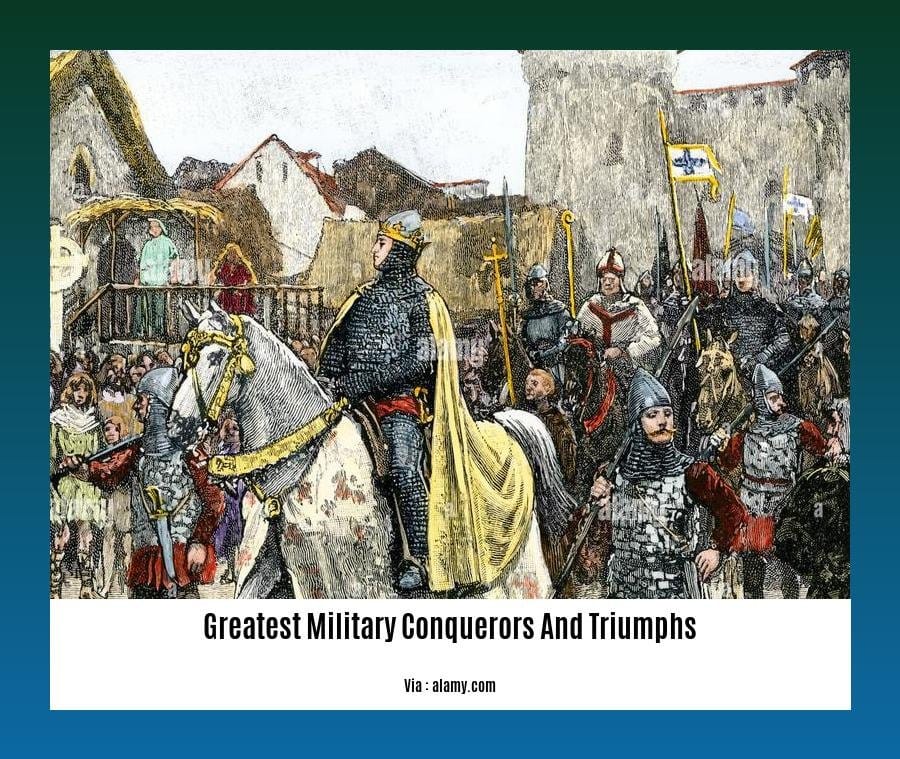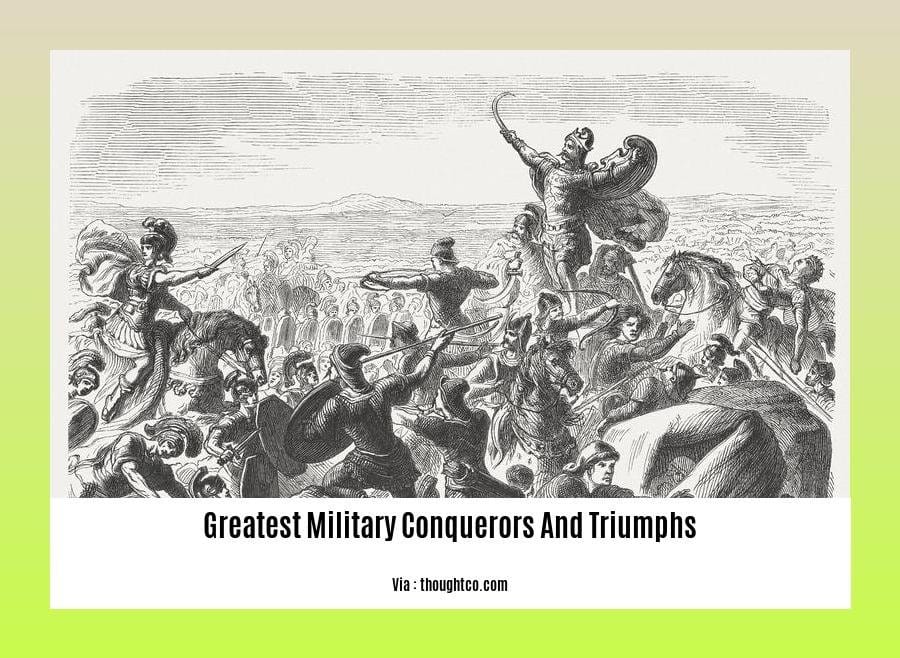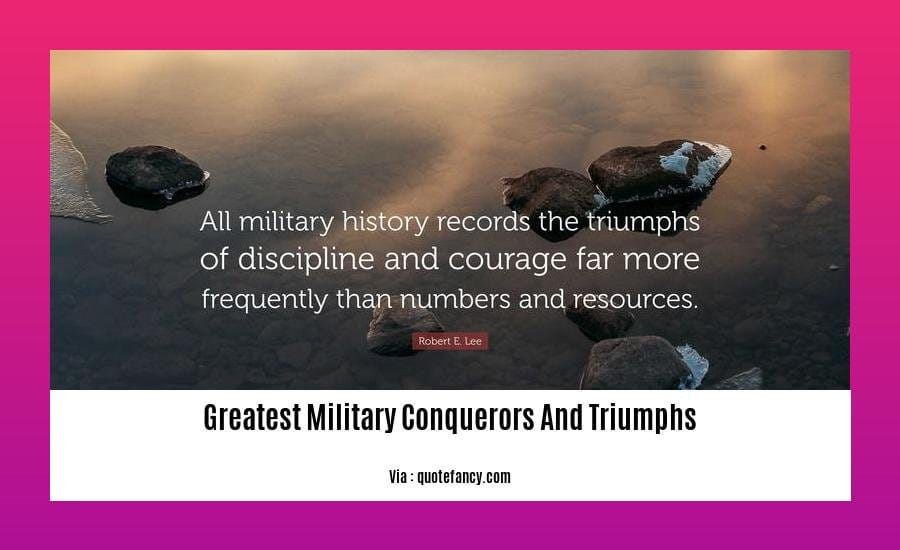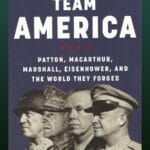Embark on an enthralling journey through the annals of military history in “Greatest Military Conquerors and Triumphs: Exploring the Strategies of History’s Finest Warriors.” This article delves into the captivating tales of the world’s most renowned conquerors, analyzing their tactics, strategies, and the profound impact they have had on the course of history. Join us as we explore the triumphs and legacies of these legendary warriors, unearthing the secrets of their military prowess and the enduring lessons they have left for generations to come.
Key Takeaways:

- Thutmose III: Expanded Egyptian territory through conquests.
- Alexander the Great: Conquered vast areas from Greece to India.
- Hannibal Barca: Carthaginian general who invaded Italy and triumphed at Cannae.
- Julius Caesar: Conquered Gaul and expanded the Roman Empire.
- Genghis Khan: Founded the Mongol Empire, the largest contiguous empire ever.
- Saladin: United the Arab world and reclaimed Jerusalem from the Crusaders.
- Joan of Arc: Significant figure in the Hundred Years’ War.
- Hernan Cortes: Conquered the Aztec Empire in Mexico.
Greatest Military Conquerors and Triumphs
Throughout history, military leaders have emerged, leaving an enduring mark on the world with their strategic brilliance and triumphant conquests.
Thutmose III: The Empire Builder
Under his reign, Egypt’s borders expanded eastward and southward, showcasing his keen tactical planning and organizational skills.
Alexander the Great: The Unstoppable Conqueror
His innovative tactics and unwavering ambition propelled him to conquer a vast empire from Greece to India, leaving behind a legacy of unparalleled military dominance.
Hannibal Barca: The Brilliant Strategist
His daring invasion of Italy, and the crushing defeat he inflicted upon Roman forces at Cannae, cemented his place as one of history’s greatest military minds.
Julius Caesar: The Statesman and General
A master of tactics and political strategy, Caesar expanded the Roman Empire to new heights, combining military strength with diplomatic finesse.
Genghis Khan: The Mongol Conqueror
With unparalleled military discipline and mobility, he founded the largest contiguous empire in history, leaving a lasting impact on Asia and Europe.
Saladin: The Unifier and Liberator
As the leader of the Muslim world, Saladin played a pivotal role in unifying Muslim forces and recapturing Jerusalem from the Crusaders.
Joan of Arc: The Maid of Orléans
Despite her humble origins, she led French forces to a series of victories against the English in the Hundred Years’ War, empowering her countrymen with hope and inspiration.
Hernan Cortes: The Conquistador
Through a combination of military prowess and strategic alliances, he toppled the Aztec Empire in Mexico, forever altering the course of history in the Americas.
These iconic figures, among others, stand as testaments to the transformative power of military strategy and the enduring legacy of the greatest military conquerors and triumphs.
From ancient battles to modern-day conflicts, military commanders celebrated for decisive victories have shaped the course of history. Explore the heart-stopping stories of these influential military leaders who led their armies to triumph against all odds.
In this chronicle of military prowess, uncover the strategies and tactics of history’s most decisive military victories, where military brilliance and valor prevailed. Witness the clashes and conquests that changed the world’s map and left an enduring legacy on the art of warfare.
Delve into the military annals and uncover the unequivocal military commander successes and routs that defined the careers of legendary military commanders. From Alexander the Great’s conquests to Napoleon’s campaigns, discover the strategies and leadership qualities that led these commanders to military dominance.
Napoleon Bonaparte: Military Genius and Empire
Key Takeaways:
- Napoleon Bonaparte is recognized as one of the foremost military minds in history.
- Expanding France’s boundaries through a series of conquests, he established an empire spanning from Spain to Russia.
- Napoleon’s brilliance was in refining existing warfare techniques rather than revolutionizing them.
Napoleon Bonaparte’s military career, spanning over two decades, has earned him acclaim as an exceptional commander. His strategic prowess and ability to inspire his troops were instrumental in his victories.
Napoleon’s Military Genius
Napoleon’s military genius lay in his ability to master existing tactics, adapting them to the specific challenges he faced. By combining artillery, cavalry, and infantry, he led his armies to overwhelming victories.
Napoleon’s Empire
Napoleon’s conquests expanded France’s territories significantly, creating an empire that stretched across Europe. His military prowess and diplomatic skills allowed him to establish alliances and conquer vast regions.
Napoleon’s Legacy
Napoleon’s impact on military history is profound. His campaigns continue to be studied by military strategists today. His reforms in military organization and tactics shaped warfare for generations to come.
Citation:
Dean, Peter J. “Napoleon as a Military Commander: The Limitations of Genius.” Napoleon Series, 2000,
Genghis Khan: Mongol Expansion and Domination
Prepare yourself for a captivating journey as we delve into the astounding rise of Genghis Khan: Mongol Expansion and Domination. This extraordinary warrior stands as a testament to the relentless spirit of conquest, forever etching his name into the annals of military history.
Key Takeaways:
- Unified Mongol Tribes: Genghis Khan’s strategic prowess united fragmented Mongol tribes, forging an unstoppable force.
- Disciplined Army: Enforcing strict discipline, Genghis Khan instilled unwavering loyalty and obedience within his ranks.
- Skilled Cavalry: Utilizing swift and agile cavalry tactics, the Mongols became masters of mobility and maneuverability.
- Advanced Weaponry: Adopting composite bows, the Mongols unleashed a deadly barrage of arrows from horseback.
- Expansionist Ambitions: Driven by an insatiable thirst for power, Genghis Khan orchestrated military campaigns that extended the Mongol Empire from Eastern Europe to the Korean Peninsula.
Unifying Mongol Tribes:
Genghis Khan’s rise to power began with the unification of scattered Mongol tribes. Through a combination of diplomacy and force, he forged a formidable alliance by bringing rival clans under his banner. This unity provided the foundation for his military conquests.
Strict Military Discipline:
The Mongol army was renowned for its unwavering discipline and obedience. Genghis Khan implemented a strict military code that emphasized loyalty, obedience, and swift execution of orders. This discipline ensured that his vast army operated as a well-oiled machine.
Skilled Cavalry Tactics:
The Mongols were masters of cavalry warfare. Their horses were hardy and swift, allowing them to cover vast distances quickly. Combined with their adept archery skills, the Mongol cavalry could launch devastating raids with incredible speed and precision.
Advanced Weaponry:
The Mongols were quick to adopt new and innovative weaponry. Their composite bows, crafted from horn, bone, and wood, allowed for a longer range and greater accuracy than traditional bows. This technological advantage gave the Mongols a significant edge on the battlefield.
Expansionist Conquests:
Genghis Khan’s expansionist ambitions drove him to launch multiple military campaigns. With his disciplined army and advanced tactics, he conquered territories from Eastern Europe to the Korean Peninsula. This unprecedented expansion created the largest contiguous empire in history, spanning across Eurasia.
Conclusion:
Genghis Khan: Mongol Expansion and Domination stands as a remarkable testament to the power of unity, discipline, and military prowess. His legacy continues to inspire military strategists and historians alike, reminding us of the transformative impact that a single warrior can have on the course of history.
Citation:
- Mongol Empire: Origin Story, Military Invasions, Rise, and Fall:
Sun Tzu: The Art of War and Military Strategy
Military strategists and historians have long revered Sun Tzu’s ancient Chinese treatise, The Art of War, as a timeless masterpiece on military strategy. Its profound insights into deception, adaptation, and leadership continue to guide military thinkers and practitioners centuries later.
Key Takeaways:
- Deception is a powerful tool. Conceal your true intentions and capabilities to gain an advantage.
- Prolonged warfare benefits no one. Seek decisive victories quickly.
- Know your enemy and yourself. This knowledge will guide your strategy.
- Secure victory before engaging in battle. Plan carefully and be confident.
- Adapt to changing circumstances. Unexpected events can disrupt even the best plans.
- Leadership is paramount. Leaders must motivate and inspire their troops.
- Discipline is essential. Well-trained and obedient soldiers ensure success.
In essence, The Art of War emphasizes the importance of strategy, deception, and adaptation in achieving military victory. Its teachings have influenced countless commanders throughout history, from Genghis Khan to Napoleon Bonaparte. By studying its principles, we can gain valuable insights into the art of war and the strategies that have shaped the course of human conflict.
Citation:
9 Timeless Strategies from Sun-tzu’s ‘Art of War’

FAQ
Q1: Which military conqueror had the largest contiguous empire?
A1: Genghis Khan, who founded the Mongol Empire, which spanned from Eastern Europe to the Korean Peninsula.
Q2: What was Napoleon Bonaparte’s greatest military achievement?
A2: Napoleon expanded the French Empire to its greatest extent, conquering territories from Spain to Russia.
Q3: How did Alexander the Great’s tactics differ from those of his predecessors?
A3: Alexander’s innovative tactics, including the use of combined arms and siege warfare, allowed him to conquer a vast empire in a relatively short period of time.
Q4: What factors contributed to the success of Hannibal Barca’s invasion of Italy?
A4: Hannibal’s strategic brilliance, coupled with his army’s superior cavalry and elephants, enabled him to defeat the Romans in several key battles.
Q5: How did Sun Tzu’s “Art of War” influence military strategy?
A5: Sun Tzu’s timeless principles of deception, adaptation, and leadership have had a profound impact on military strategy throughout history, guiding commanders to victory on countless battlefields.
- Star Ring Trends: Etsy vs Amazon - March 28, 2025
- Boost Pollinator Habitats: Baby Blue Eyes Sustainable Farming Guide - March 28, 2025
- Protect Big Black Bears: Effective Conservation Strategies - March 28, 2025
















